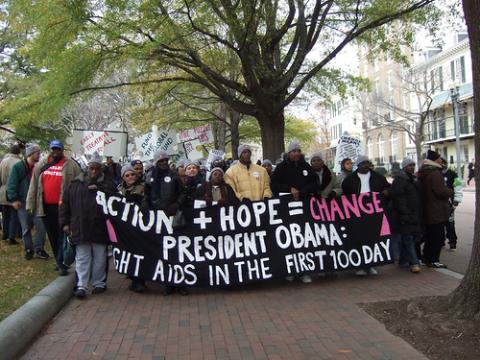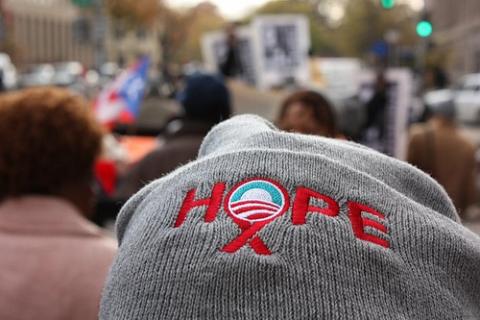World AIDS Delay or Why We Really Need, and May Even Get, A National U.S. AIDS Strategy
The change we need for the country as a whole is the change we need to fight HIV/AIDS. Let's insist that economic stimulation and health care reform become components of a comprehensive strategy to fight HIV/AIDS, rather than being complicit with this stable epidemic that will infect another person every nine minutes on this World AIDS Day.
On November 20, over 1000 low-income people of color living with HIV came to the 100 Days to Fight AIDS rally to stand up for the ambitious HIV/AIDS platform under which Obama campaigned for president, including his pledge for a National AIDS Strategy.
 100 Days to Fight AIDS Rally
100 Days to Fight AIDS Rally
For a change, we approached the nation’s capitol in the lead-up to World AIDS Day with a spirit of hope. In the coming months, we must continue to push forward with an expectation of more – not just more resources for existing HIV/AIDS efforts, but for a more strategic and more coordinated, comprehensive response that will actually bring down the rate of infection, tackle the epidemic in communities of color and in gay men, and bring dignity and medical care to the lives of all those who are infected.
And change is what we need. Since we last commemorated World AIDS Day, it’s been confirmed that HIV/AIDS is worse in the United States than we ever knew.
In August, CDC finally revealed the data showing that incidence of HIV has always been higher than the 40,000-new-infections-a-year figure trotted out for over a decade – and that the epidemic has stubbornly wedged itself into our society at the rate of 56,300 new cases a year.
CDC calls that a stable epidemic.
I call it a travesty.
And think those that are infected are able to get the care they need? Those flaming radicals at the Institute of Medicine have noted that over half of those who should be on AIDS treatment can’t get it consistently.
 On this World AIDS Day, let’s set down the slogans for a second and take a long sober look at where we are at, and where we need to go.
On this World AIDS Day, let’s set down the slogans for a second and take a long sober look at where we are at, and where we need to go.
There’s three things we need to do to overcome HIV in our nation:
1) Fund what we know works, like syringe exchange and the provision of HIV/AIDS antiretrovirals and basic health care to all who need it;
2) Stop funding things that don’t work, or that cause harm, whether it’s Federally-funded stigma promotion, a.k.a. abstinence-only programs; and
3) Figure out what the hell we need to do in the cases where we just don’t know.
Even though we know a lot of what we need to do to fight HIV/AIDS, anyone who tells you we know exactly what we need to do to solve the epidemic in this nation – or around the world, for that matter – is either naive or lying.
For example, there’s a big disconnect in the fragmented HIV/AIDS service sector between prevention programs and the provision of HIV care. Yet HIV treatment itself is increasingly recognized as a contributor to HIV prevention – when people know their status, are in care, and receiving effective treatment, they are less likely to pass on the virus. But as spread thin as people are who work in either prevention or care, with little time for strategizing or collaboration, there’s also additional obstacles to working together based on funding streams, red tape, and a lack of overarching, systematic and measurable priorities in the domestic AIDS sector.
Sound like a complex problem and, well, kind of geeky and bureaucratic? It is.
And that’s just one example of why we need a National AIDS Strategy (NAS). A true NAS wouldn’t be a re-branding of current HIV/AIDS efforts in the US. It wouldn’t even be a label for a new initiative to scale-up our overloaded efforts to combat the epidemic in a nation.
The NAS needs to be a fundamental re-think of how we fight HIV in this country – the plan that moves past the patchwork of current programs and that figures out a better way and assigns responsibility for doing it.
The US global AIDS response (through PEPFAR) is not without its problems but emphasizes target setting, coordination, and accountability for outcomes. These key principles are lacking in our domestic effort. Like PEPFAR, an effective domestic NAS needs to be owned by the government with strong Presidential leadership and present an operational plan.
So what now? Action on the NAS early in the new Administration would cost little but demonstrate decisive action on health issues. The Coalition for a National AIDS Strategy is urging our next President, within his first 100 days, to:
- speak publicly about the need to more effectively address our biggest public health challenges, including AIDS at home;
- appoint a National AIDS Strategy Panel to develop the Strategy; and
- create a White House-level AIDS office and appoint staff to lead on the Strategy.
We need the President to urge the Panel to be creative and courageous, and to stay focused on improving outcomes rather than placating constituencies. We don’t need a laundry list to appease everyone, but rather a plan of action to increase our effectiveness. The Panel should identify measures that can be taken quickly, as well as more fundamental changes needed over time. For example, improving coordination of government agencies can be mandated quickly and at no cost.
Even as we push forward towards the NAS, however, we do know much of what we need to embark upon to start to bring the epidemic under control. And it sounds a lot like what we need to do for this whole country to get back on its feet:
- Provide health care for all
- Ensure housing for those in need (which is what DC Fights Back and allies will be marching for in Washington DC on this World AIDS Day).
- Confront the poverty that leads to a whole range of health challenges, including HIV, and that is getting worse by the day as our economy is in free-fall triggered by a generation of greed and inequity.
- Invest in American ingenuity, as they say, by supporting a robust platform of uncensored research at and beyond the NIH, rather than turning away a new generation of researchers seeing funding fall way below the rate of biomedical inflation.
- Make the inclusion of gays and lesbians in Obama’s victory speech a real thing by including LBGT people and our needs in public health and social programs, and by waging a mass public education effort to confront anti-gay and anti-trans bias so no one can be hoodwinked again by Prop 8 campaign style lies.
The change we need for the country is the change we need to fight HIV/AIDS. Let’s insist that economic stimulation and health care reform become components of a comprehensive strategy to fight HIV/AIDS, rather than being complicit with this "stable" epidemic that will infect another person every nine minutes on this World AIDS Day.
